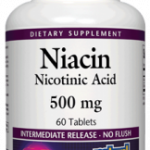- Type of Drug: Vitamin.
- Prescribed for: Treatment of pellagra (Niacin deficiency). Niacin is also used to help lower high blood levels of lipids (or fats) and to help dilate certain blood vessels. Some experts have suggested using it in the treatment of schizophrenia, although there is no good evidence to support megadoses of this vitamin as a treatment for that disorder.
Niacin (Nicotinic Acid) General Information
Niacin, also known as vitamin B3, is essential to normal body function through the part it plays in enzyme activity. It is effective in lowering blood levels of fats and can help dilate (enlarge) certain blood vessels, but we do not know exactly how it does these things. Normally, individual requirements of Niacin are easily supplied in a balanced diet.
Cautions and Warnings
Do not take this drug if you are sensitive or allergic to it (or to any related drugs) or if you have liver disease, stomach ulcer, severely low blood pressure, gout, or hemorrhage (bleeding).
When you are Taking Niacin in therapeutic doses, your doctor should periodically check your liver function and blood-sugar level. Diabetics may experience an increase in blood sugar.
Blood levels of uric acid may rise; people who are prone to gout may experience an attack.
Niacin (Nicotinic Acid) Possible Side Effects
- Most common: flushing (redness and warmness in the face and hands), which may occur within 2 hours of taking the first dose of Niacin.
- Less common: decreased sugar tolerance in diabetics, activation of stomach ulcers, jaundice (yellowing of the eyes and skin), stomach upset, oily or dry skin, aggravation of some skin conditions (such as acne), itching, high blood levels of uric acid, low blood pressure, temporary headache, tingling feeling in the hands or feet, skin rash, abnormal heartbeats, and dizziness.
Drug Interactions
- Niacin can intensify the effect of blood-pressure-lowering drugs, causing postural hypotension (dizziness when rising quickly from a sitting or lying position).
- Niacin may interfere with Sulfinpyrazone’s effect (for gout).
- Lovastatin taken together with Niacin may lead to the destruction of skeletal muscle cells. One case of this interaction has been reported.
Niacin (Nicotinic Acid) Food Interactions
Take Niacin with or after meals to reduce the chances of stomach upset.
Usual Dose
Vitamin Supplement
25 mg per day.
Niacin Deficiency
Up to 100 mg per day.
Pellagra
Up to 500 mg per day.
High Blood-Fat Levels
Initial dose, 1 or 2 grams 3 times per day; take with a glass of cold water to help you swallow. The dose should be increased slowly so you can watch for common side effects.
Overdosage
Overdose victims may be expected to show drug side effects. Take the victim to a hospital emergency room for treatment. ALWAYS bring the medicine bottle.
Niacin (Nicotinic Acid) Special Information
Skin reactions may occur within 2 hours after taking the first Niacin dose, and may include flushing and warmth (especially in the face, ears, or neck), tingling, and itching. Headache may also occur. Call your doctor if these effects don’t disappear as you continue taking Niacin.
If you forget to take a dose of Niacin, take it as soon as you remember. If it is almost time for your next dose, skip the missed dose and continue with your regular schedule. Do not take a double dose.
Niacin (Nicotinic Acid) Special Populations
Pregnancy/Breast-feeding
When used in normal doses, Niacin can and should be taken by pregnant women as part of a prenatal vitamin formulation. But if it is used in high doses (to help lower blood-fat levels), there may be some problems.
Although this drug has not been shown to cause birth defects or problems in breast-fed infants, consult with your doctor about taking doses of Niacin large enough to lower blood fats if you are nursing.
Seniors
Seniors may take this medication without special restriction. Follow your doctor’s directions and report any side effects at once.

